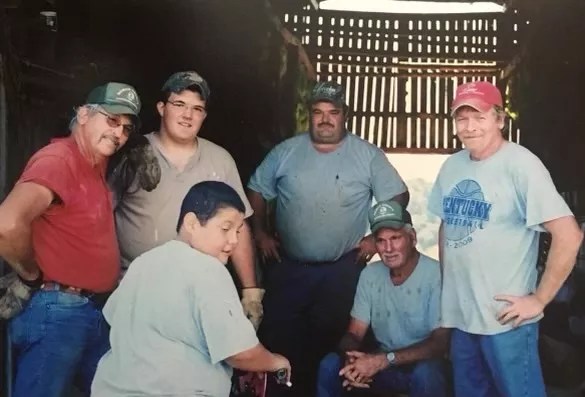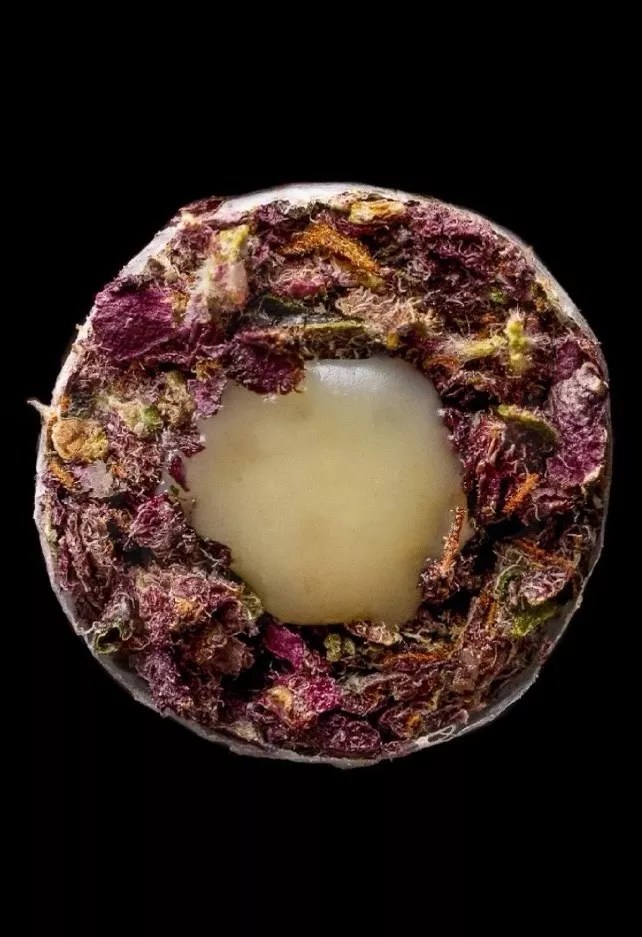
Courtesy of Kayne Perry

Audio By Carbonatix
Kayne Perry and three generations of his family grew up on a tobacco farm, but he was clearly meant to roll up Diesels and OGs instead.
Walking into a pre-rolled joint operation used to be a trip to the slaughterhouse. You didn’t want to see how the sausage was made, because you might not buy it again after what you saw; it only took one pull on most pre-rolls to know that the snouts and hooves of a grow were inside. But at Red Roots Rolling Company, Perry’s upstart outfit located in a tiny room behind a dispensary in northwest Denver, everything is free-range.
“I roll anywhere from 50 to 75 pearls a day,” Perry says in a soothing Southern accent just as thick as his beard. “There’s no assembly line here. It’s just me and a couple of friends who help around here and there. I have that standard to keep.”
Inside the Red Roots facility are to-go condiment cups – each filled with two grams of gas-scented flower from Mighty Tree, a local cultivation – that sit next to rolled-up balls of solventless rosin, wooden smoking crutches and handcrafted filters. It’s a tight squeeze, but Perry couldn’t be more proud of the enterprise. Red Roots is changing how people view pre-rolls in Colorado, one laboriously crafted joint at a time.
These are more than joints, though. They’re hash holes.
Also known as doughnut joints, hash holes are joints rolled with a strip of rosin, bubble hash or other forms of cannabis concentrate delicately placed in the middle of the flower. While you smoke it, the hash melts into oil and seeps into the flower as it burns, leaving a hole in the center of the joint.
After noticing hash holes were becoming more popular on social media and in California, Perry found his calling. It took time for everything to come together, however.
Perry was raised by his grandparents in Kentucky on that tobacco farm. He and his grandfather would take the family harvest to public wholesale markets, where it would be graded and bid on. Although not much of a tobacco smoker himself, he grew up watching his grandfather roll his own cigarettes, which Perry would emulate with brown paper bags “just because it looked fun,” he recalls. As Perry learned how to grade plants with his nose, appreciate what a good post-harvest cure does for the smoking experience and twist up loose-leaf tobacco, a craftsman was being molded even if he didn’t realize it.

Also known as doughnut joints, hash holes are all the rage on social media.
Red Roots Rolling Company
“I knew I wanted to do something bigger, and something with this plant, and I knew I didn’t want to trap in Kentucky just to make quick money, either. I wanted to get a license and really do my own thing,” Perry recalls. “I just didn’t know what that would be at the time.”
Perry moved to Colorado in 2018, shortly after turning eighteen, with one goal in mind: working in the legal cannabis trade. He hadn’t reached the minimum required age of 21, but since anyone who wanted to work or invest in the cannabis industry had to live in Colorado for three years in order to establish residency, he thought he was planning ahead. He moved to Gunnison and worked at Walmart while waiting to go pro.
Colorado’s cannabis residency requirement was removed in 2020, so Perry briefly returned to Kentucky to be closer to family, but he was hardly deterred from his goal. Back in Colorado on the day he turned 21, Perry drove a couple of hours to the closest Colorado Marijuana Enforcement Division office to get badged and permitted to work in the industry.
After bouncing around wholesale growing operations, Perry ended up at Green Dragon as a budtender. His manager came across one of his joints at work, and was impressed enough to recommend that Perry pursue it as more than a hobby; so did more than a few friends.
“I started experimenting with all sorts of things, like pressing cannabis to make cannagars. I’d roll these 14-gram blunts that would smoke for hours and hours on end. I wanted to make things that other people would love, but I also wanted to find a niche that was more comfortable and easily attainable,” he explains. “Once I figured it out, I had friends hitting me up for them all the time, even asking for a bunch to take to weddings. I saw that these could be a celebratory thing.”
Perry began showcasing his creations on Instagram, where a handful of cannabis businesses noticed his talent and started calling. He toured grows, extraction labs and dispensaries before eventually partnering with Mighty Melts, the rosin arm of Mighty Tree. Although his 2.6-gram joints aren’t exclusive to Mighty Tree and Mighty Melts, and Perry has collaborated with other hashmakers in the past, the majority of Red Roots pre-rolls are currently made under the partnership.
He regularly visits his partner cultivation and extraction lab, and even has his own curing process for flower “to ensure that it burns evenly” in the pre-rolls, he notes. Perry only uses Elements rolling papers “because the rice gum sticks the best,” and doesn’t trust other people to roll his Red Roots joints. Now some of the Denver area’s most popular dispensaries, such as Colorado Harvest Company, Cookies and Eclipse are purchasing up to 100 joints per order. The joints, priced around $50 to $60 before tax, don’t stay on the shelf long.
Well aware of the Colorado cannabis industry’s ongoing recession, Perry knows that if dispensary shoppers spend a lot of money on a Red Roots joint and aren’t impressed the first time, they probably won’t return. Rolling hash hole joints isn’t an easy task for the average cannabis user, however, and Perry believes the quality of the ingredients speaks for itself. The vast majority of Red Roots joints are smoked by multiple people or over multiple sessions, as well.

Perry’s Red Roots joints are made with 2 grams of flower and 0.6 grams of rosin.
Red Roots Rolling Company
“I took two years of my life living in a small mountain town, working at a shitty-ass Walmart, just to get my badge. And it turns out, I didn’t even have to do that,” Perry says. “It was worth it, though. I never thought I’d be selling out in dispensaries and that people would be mad that they don’t have my joints. I could be on more shelves and push subpar products, but that’s just not what I’m chasing.”
Red Roots was chasing a brand identity while still underground, following a trail blazed by George Hashington, a new and rising retail extractor in Colorado, and Savage Cannagars, a pre-roll and joint paper brand that also has a large social media following. Modeling his business after “people who were doing it before it was legal and licensed, who were taking the risk” has helped Perry stick up for himself as a Black man in the competitive cannabis field.
“There aren’t many Black owners in this industry, from what I understand,” says Perry, now 25 and with a son of his own. “I take a lot of pride in it, as it seemed very daunting at first.”
As the past decade in the cannabis field has shown, the challenges probably aren’t over for Red Roots. Competing products have already popped up in Colorado dispensaries as the price of Colorado cannabis and rosin fluctuates by the month. Still, one day Perry hopes to grow the company enough that he can own his own facility, and maybe even expand back into Kentucky if the state ever legalizes.
Whatever obstacles or growing pains may be coming his way, Perry is staying true to his roots.